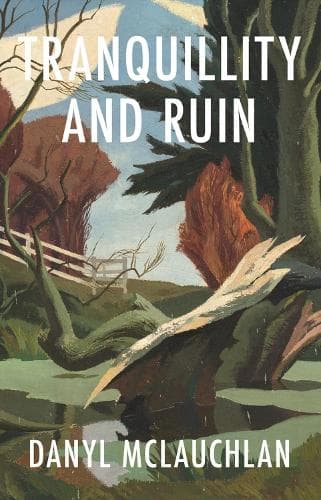Review: Tranquillity and Ruin
Reviewed by Sam Finnemore
Danyl McLauchlan’s new collection of essays has its most immediate lineage in his non-fiction and opinion pieces at The Spinoff, but it’s hard not to be reminded of his “comic noir” Aro Valley novels when he recalls wandering through suburban Wellington at three in the morning, following the sound of a choir he later realises doesn’t exist.
Fictional protagonist “Danyl” might have found himself semi-accidentally on the trail of a shadowy underground cabal. Husband and father McLauchlan instead dismisses it as a blip in managing an anxiety disorder, before picking up on his wife’s suggestion that he try meditation.
In part, Tranquillity and Ruin is McLauchlan’s squaring of that decision with his own self-image and public persona: rational, scientific and unmoved by wishful thinking, whether political or spiritual. This is not new territory in outline – middle-aged sceptic tries “spiritual”-coded activity, discovers there might be something in it – so in the first two essays, it’s refreshing to see his meditation journey explored from a frank and personal angle but with a minimum of self-regard and with an easy back-and-forth between subjective experience of Buddhist practice and readings from biology and neuroscience that seem to offer clues to how it all happens.
The central essay of the collection takes a striking turn from mindfulness and silent retreats to the hyper-communicative environment of an Effective Altruism conference, where attendees discuss the application of data science and rational methods to do the maximum good for the maximum number of people – often preferentially for trillions not yet born.
McLauchlan is in an observer mode here, recounting his interactions with EA practitioners (who are often very aware of the odd directions their movement can take) alongside examining the underpinning philosophy. It’s denser, more abstract and somehow less intimate than the earlier essays, and heaven help you if you forget midway through what an x-risk is. But it’s mostly generous to the people involved and presents esoteric and challenging ideas with a light touch.
The book’s switches between personal anecdote and theory occasionally wear thinner than would be the case in a stand-alone essay but Tranquillity and Ruin gets through these rougher patches via the sense that interpreting experience through the relevant literature is part and parcel of the author’s approach to the world.
McLauchlan invites readers to relish his lingering scepticism, including when he’s stumped in the moment to explain something outside of a rational framework and later ferrets out a scientific article that posits a reasonable explanation (phew). His furtive devouring of a forbidden éclair at a Buddhist festival is also something straight out of novel-Danyl’s experiences, although the protagonist almost certainly wouldn’t have gotten away with it so lightly.
You’d expect Tranquillity and Ruin to be welcomed by those agreeing with Steve Braunias’s praise of McLauchlan as “likely the most intelligent essayist in New Zealand”. Others might find that quote’s appearance on the gatefold cover makes it harder to take McLauchlan’s moments of self-deprecation at face value.
But it’s also possible, and enjoyable, to take in Tranquillity and Ruin on a meta-level as a single, distinctive personal document, with the wrangling of theory and philosophy indivisible from getting a good night’s sleep or explaining the nature of time to a child while waiting for a bus. On balance, it’s a journey worth taking.
